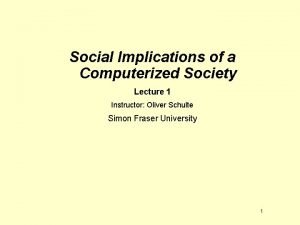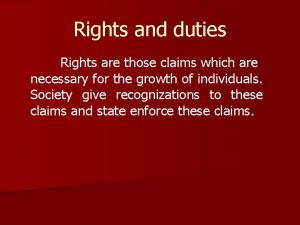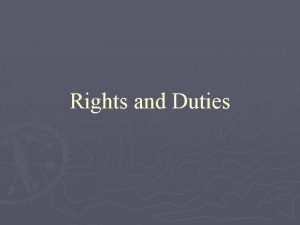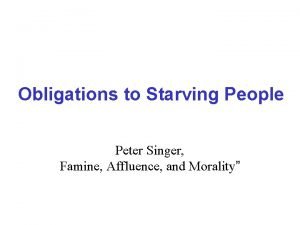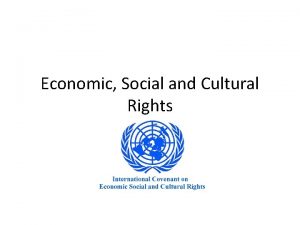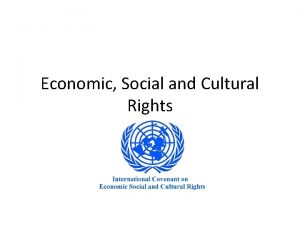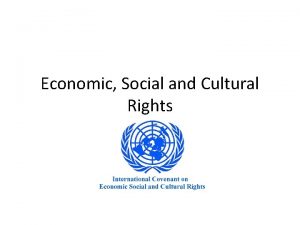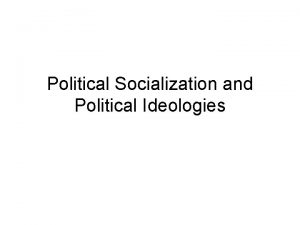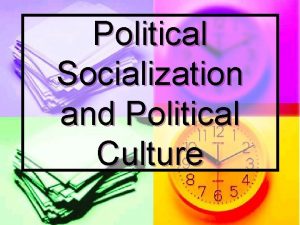Economic Political and Social Rights Economic and Social










- Slides: 10

Economic, Political and Social Rights

Economic and Social Rights �Article 38: State to secure a social order for the promotion of welfare of the people The State shall strive to promote the welfare of the people by securing and protecting as effectively as it may a social order in which justice, social, economic and political, shall inform all the institutions of the national life. The State shall, in particular, strive to minimise the inequalities in income, and endeavour to eliminate inequalities in status, facilities and opportunities, not only amongst individuals but also amongst groups of people residing in different areas or engaged in different vocations.

Economic and Social Rights � Article 39: Certain principles of policy to be followed by the state The State shall, in particular, direct its policy towards ensuring: that the citizens, men and women equally, have the right to an adequate means of livelihood that the ownership and control of the material resources of the community are so distributed as best to sub-serve the common good that the operation of the economic system does not result in the concentration of wealth and means of production to the common detriment that there is equal pay for equal work for both men and women that the health and strength of workers, men and women, and the tender age children are not abused and that citizens are not forced by economic necessity to enter a vocation unsuited to their age or strength that children are given opportunity and facilities to develop in a healthy manner and in conditions of freedom and dignity and that childhood and youth are protected against exploitation and against moral and material abandonment.

Economic and Social Rights � Article 39 A: Equal justice and free legal aid The State shall secure that the operation of the legal system promotes justice, on a basis of equal opportunity, and shall, in particular, provide free legal aid, by suitable legislation or schemes or in any other way, to ensure that opportunities for securing justice are not denied to any citizen by reason of economic or other disabilities. � Article 40: Organisation of village Panchayats The State shall take steps to organize village Panchayats and endow them with such powers and authority as may be necessary to enable them to function as units of self government.

Economic and Social Rights � Article 41: Right to work, to education and to public assistance in certain cases The State shall, within the limits of its economic capacity and development, make effective provision for securing the right to work, to education and to public assistance in cases of unemployment, old age, sickness and disablement, and in other cases of underserved want. � Article 42: Provision for just and humane conditions of work and maternity relief The State shall make provision for securing just and humane conditions of work and for maternity relief. � Article 43: Living wage for workers The State shall endeavour to secure, by suitable legislation or economic organisation or in any other way, to all workers, agricultural, industrial or otherwise, a living wage, conditions of work ensuring a decent standard of life and full enjoyment of leisure and social and cultural opportunities and, in particular, the state shall endeavour to promote cottage industries on an individual or co-operative basis in rural areas.

Economic and Social Rights � Article 43 A: Participation of workers in management of industries The State shall take steps, by suitable legislation or in any other way, to secure the participation of workers in the management of undertakings, establishments or other organisations engaged in any industry. � Article 44: Uniform civil code for the citizens The State shall endeavour to secure for the citizens a uniform civil code throughout the territory of India. � Article 45: Provision for early childhood care and education to children below the age of six years The State shall endeavour to provide early childhood care and education for all children until they complete the age of six years. � Article 46: Promotion of educational and economic interests of Scheduled Castes, Scheduled Tribes and other weaker sections The State shall promote with special care the educational and economic interest of the weaker sections of the people, and, in particular, of the Scheduled Castes and the Scheduled Tribes, and shall protect them from social injustice and all forms of exploitation.

Economic and Social Rights � Article 47: Duty of the State to raise the level of nutrition and the standard of living and to improve public health The State shall regard the raising of the level of nutrition and the standard of living of its people and the improvement of public health as among its primary duties and, in particular, the state shall endeavour to bring about prohibition of the consumption except for medicinal purposes of intoxicating drinks and of drugs which are injurious to health. � Article 48: Organization of agriculture and animal husbandry The State shall endeavour to organise agriculture and animal husbandry on modern and scientific lines and shall, in particular, take steps for preserving and improving the breeds, and prohibiting the slaughter of cows and calves and other milch (that yield milk) and draught cattle (used for labour). � Article 48 A: Protection and improvement of environment and safeguarding of forests and wild life The State shall endeavour to protect and improve the environment and to safeguard the forest and wild life of the country.

Economic and Social Rights � Article 49: Protection of monuments and places and objects of national importance It shall be the obligation of the State to protect every monument or place or object of artistic or historic interest, declared by or under law made by Parliament to be of national importance, from spoliation, disfigurement, destruction, removal, disposal or export as the case may be. � Article 50: Separation of judiciary from executive The state shall take steps to separate the judiciary from the executive in the public services of the state. � Article 51: Promotion of international peace and security The state shall endeavour to: Promote international peace and security Maintain just and honourable relations between nations Foster respect for international law and treaty obligations and the dealings of organised people with one another Encourage settlement of international disputes by arbitration

Political Rights � Right to vote: It is very important right in a democratic country. It says that every adult citizen (18 years of age) has the right to express his/ her opinion by using power of vote at the time of election. � Right to contest elections: It is the right of an individual to contest in the election and represent himself in the government. But there are certain requirements for the representative, which must be fulfilled. � ‘Right to vote’ and ‘Right to contest election’ is not incorporated in fundamental rights. Article 325 recognizes right to vote. � Right to public offices: All citizens are equally eligible to hold any public office under the State. There should be no discrimination on basis of religion, caste, gender or language. � Right to petition: All citizens have right to file petitions individually or in a group to the competent authority, for redress of grievances.

Political Rights � Right to criticize government: Every citizen has right to criticize the government for their policies. In democracy the government is by discussion and criticism. � Right to Residence: All citizens have right to live in any part of the country provided it does not endanger the safety of the State. This right is political right because it is only for the citizens of the country. � Right to protection while staying abroad: Every citizen, while staying abroad, can seek protection from the home state, if the situation arises. � Right to public meeting: Every citizen has freedom to hold a meeting in the public interest. It is associated with the right to form associations. � Right to form political parties: All citizens have the right to form political parties and to participate in the political process. � Right to oppose the government: Every citizen has right to oppose the government when it may fail to protect their interests. But this opposition should be in a peaceful manner and as per the law.


